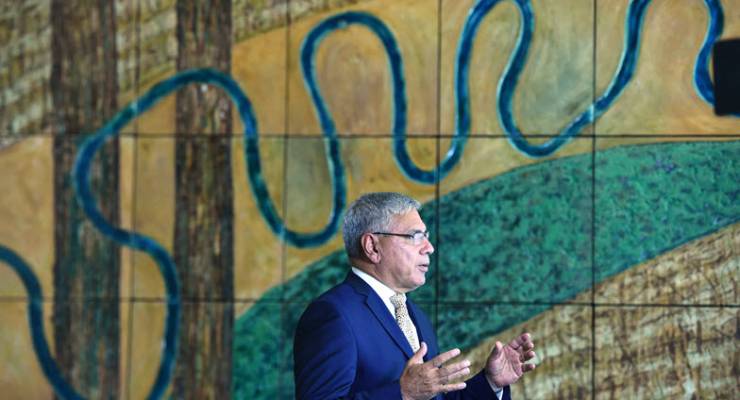
“Quick loans to high-risk people without capital or experience!” No, it’s not an ad in the back of Golf Magazine, it’s the gist of an op-ed in The Australian Financial Review. The author? Nyunggai Henderson Warren Mundine.
The argument? Indigenous business start-ups should have loans given to them with no regard for the inherent risk. Yes, you read that correctly. A minor piece in itself, the article is a measure of the desperate times for the Mundine-Pearson model of remote-area development.
Mundine argues that many Aboriginal people wanting to get into business cannot get loans, lacking collateral or track record. Fair point. His solution? Dish out state loans, with no regard not only for the lendee’s collateral — a reasonable suggestion — but for the potential market itself:
Initiatives such as IES and IBA are targeted at people who haven’t been participating in the real economy — who live in remote areas with no developed economy…
Mundine would now like to dish it out in the millions. The insouciance is staggering:
Even if a new business fails, the experience of setting up and operating a business is valuable…
Mundine says that the tight and slow assessment of loan applications is a process of government “picking winners”. By “picking winners” he appears to mean “due diligence”.
Remember, this is someone who has backed the intervention, and the Indue cashless welfare card. So people trying to get by are micromanaged, dole-breached for trifles, bullied and berated. If they get in a business loan app, the money goes straight into their account. Moral hazard? Fuggedaboutit.
Why the double standard? Because the proposal is simply ideological insistence: remote-area Indigenous Australia will develop as a free-market capitalist economy. Remote-area white Australia never did; it was a state-capitalist monopsony. Non-state self-reliance is a just-so story country people tell themselves.
Should Aboriginal people have easier access to capital? Absolutely. But what’s the point of advocating fast-track processes in this field, without acknowledging that every other part of remote-area life has involved the total removal of autonomy in the decade since the intervention?
Sadly, it’s just more Mundinery-Pearsonry, one ad hoc solution piled on another, with no regard to a consistent political attitude. And it’s a measure of their political agenda being pursued, that the AFR would publish a piece of Whitlamish cash-splashery it would otherwise laugh out of the office. For if one were to admit that full market capitalism will not work in remote areas, it would have to be acknowledged that there are alternatives to it everywhere.
Talk about moral hazard.








malcolm`s man mundine has sold his soul to the coalition, nothing he says or does will be in the best interests of australia`s indigenous people he just parrots the coalition line and does as he`s told
Fair enough Guy, but what’s you suggestion for the long term viability of remote area communities?
recognising that they will never be capitalist communities, dominated by wage labour, private industry and profit. The economies of scale arent there, quite aside from cultural issues.
Instead, as numerous non Mundine-Pearson commentators have suggested, a hybrid economy with a mix of direct state support, market activity, co-operative activity, subsidised care for country, cultural renewal etc. Stop punishing remote area people – with dole breaching etc – for the absence of a fantasy economy.
If the whites in the Top End (and other far flung rural areas) were not congenitally attached to the government teat as a lifestyle choice (copyright Abbottrocious) there might be some slight chance for this dumb proposal.
They ain’t and there isn’t.
What do you mean remote-area Australia never developed as a green market economy. What do you call Sydney, Melbourne, Brisbane and Perth. Once upon a time they were remote, low populated towns. More remote in the world than any country community in Australia today.
Should say “free market” not “green market”. No editing tool Crikey??